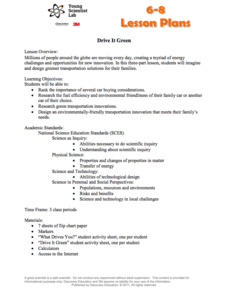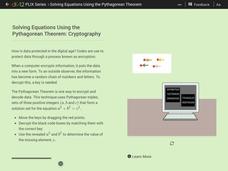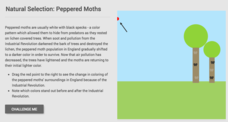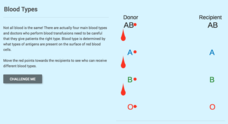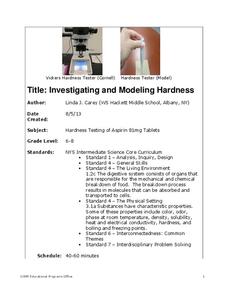Balanced Assessment
Frosting on the Cake
Party planners need algebra too! Here, pupils decide the perfect size of a cake based on available ingredients. They use the concepts of area and perimeter to make their conclusions.
Rochester Institute of Technology
Skateboard Performance Testing
Perform an activity on performance testing with a lesson focused on the purpose of wheel bearings on skateboards. Learners conduct performance testing on a skateboard to collect and interpret data.
NOAA
Deep-Sea Ecosystems – Chemosynthesis for the Classroom
Photosynthesis was discovered in the 1770s, but chemosynthesis wasn't discovered until 1977. While many have performed an experiment to show how photosynthesis works, the activity allows pupils to observe chemosynthesis. Scholars set up...
TryEngineering
Computing in the Cloud
What and where is "the cloud"? The lesson teaches scholars about the history of cloud computing and about its current uses. It also teaches how to install a multiple guest OS in a host OS and how to use cloud computing services.
National Constitution Center
Interactive Constitution
Did you know there are seven Articles and 27 Amendments to the US Constitution? Explore each and every one of them, including the Bill of Rights and other rights around the world, in a super neat US Constitution interactive.
Discovery Education
Drive it Green
Explore and brainstorm innovations for cars with a STEM lesson that asks scholars to weigh different options when considering when buying a car. They research the fuel efficiency and carbon emissions for various options, and then design...
Code.org
Image Scroller with Key Events
Discover how to embed images in lists. Scholars modify an existing app to include an image scroller in the 17th lesson of the series. They learn to refactor code and remove redundancies after modifying code.
Chicago Botanic Garden
Impacts of Climate Change
Scholars become experts on the eight major impacts of climate change through a jigsaw and grand conversation. They then research and present what they learned about effects specific to their region.
Teach Engineering
Aerogels in Action
Model an oil spill cleanup. An engaging engineering lesson has groups using aerogels to simulate an oil spill cleanup (vegetable oil in water). Along the way, they learn about nanotechnology and hydrophilia/hydrophobia.
Cornell University
Weed IPM
Go on a weed hunt! Scholars gain insight into the characteristics of plants and examine the outdoor environment in order to identify five different types of weeds. Learners then show what they know with a one-page reflection.
CK-12 Foundation
Solving Equations Using the Pythagorean Theorem: Cryptography
Don't keep this resource a secret. Individuals learn to use the Pythagorean Theorem to find Pythagorean triples. They also see how Pythagorean triples can be useful in the field of cryptography to encrypt secret messages.
CK-12 Foundation
Modern Genetics
Genetic counselors advise their clients on the chance of passing specific diseases on to their children. Pupils learn about genotypes, phenotypes, and genetics in the lesson. Matching activities, multiple-choice questions, and a...
CK-12 Foundation
Natural Selection: Peppered Moths
Can human activity influence the colors of moths? The simulation explains how pollution changed the color of tree bark, which led to the survival of a different variation of moths. It also discusses the shift back as air quality improves.
CK-12 Foundation
Blood Types
Does your blood type matter? The video explains the four main blood types and the importance of knowing blood types when performing transfusions. The interactive reviews the information with a quick graphic organizer and questions.
PBS
Before We Travel, We Research
Context is key when it comes to historical research. Prior to field research, class members learn as much as they can about the site they are going to visit. Groups investigate and prepare presentations about the history of the site, the...
Cornell University
Investigating and Modeling Hardness
Model hardness testing with a self-designed hardness test. Young scholars rate the hardness of different types of aspirin using the Vicker's Hardness scale. They then relate hardness to the solubility of each aspirin tablet.
DiscoverE
Puff Mobiles
You've probably heard of solar-powered cars, but what about wind-powered cars? Scholars build cars that can travel at least six feet. They can only use their breath to move the car—so, obviously, a sail might be a good feature for the...
National Constitution Center
Abraham Lincoln's Crossroads
History enthusiasts participate in an interactive website that brings Abraham Lincoln to life as he shares his personal experiences between 1854-1864. Scholars listen and read carefully to form their own opinions and discover if they...
DiscoverE
Build an Earthquake-Resistant Structure
Future engineers design and build structures out of toothpicks and marshmallows. They then make sure the structures can withstand an earthquake simulator!
DiscoverE
Harmless Holder
Here's a lesson that's not for the birds! Scholars design and build packaging for soda cans that is environmentally friendly. These packages must be durable, easy to carry, and have no environmental impact.
DiscoverE
Product Dissection
Sometimes, taking things apart is more fun than putting things together. Groups of learners participate in a reverse engineering activity. They dissect a device of their choosing to see how it works—great hands-on learning from the...
Western Education
Math Poems
The logic, rhythm, and beauty of math sometimes get lost amidst numbers and variables. Amplify math's lyricism with a poetry project that uses metaphors and similes to compare mathematical concepts to other images.
Science 4 Inquiry
The Ups and Downs of Populations
As the reality of population decline across many species becomes real, pupils learn about the variables related to changes in populations. They complete a simulation of population changes and graph the results, then discuss limiting...
Generation Rx
Medication Safety Patrol: Activity Stations
Four stations challenge scholars to show what they know about the safety of taking and storing medications. Small groups rotate to read and answer questions regarding prescriptions drugs, examine prescription labels, identify appropriate...







